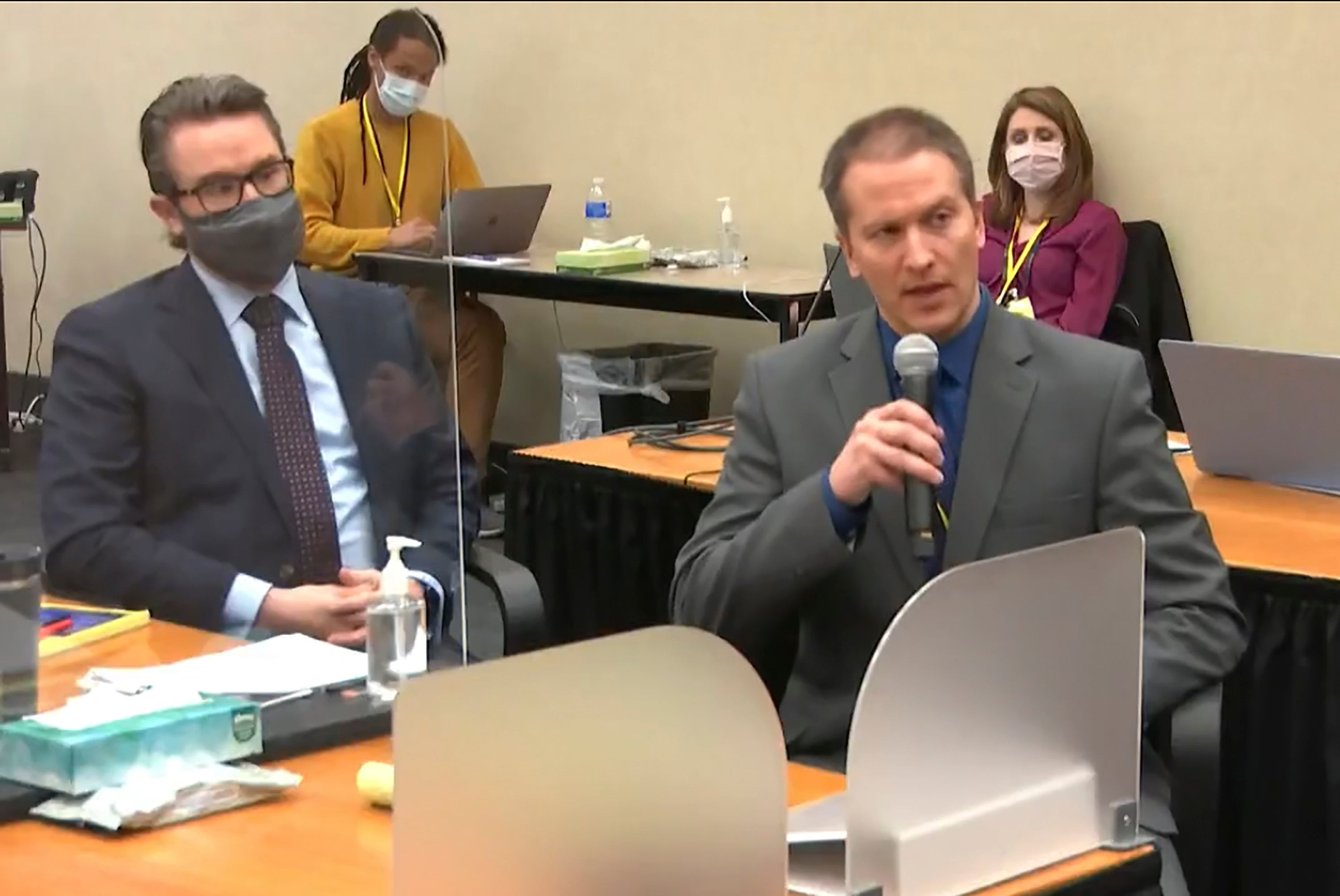State seeks 30 years for Chauvin; defense wants time served
Prosecutors are seeking a 30-year sentence for the former Minneapolis police officer convicted of murder in the death of George Floyd, but a defense attorney is asking that Derek Chauvin be sentenced to probation and time already served

Your support helps us to tell the story
From reproductive rights to climate change to Big Tech, The Independent is on the ground when the story is developing. Whether it's investigating the financials of Elon Musk's pro-Trump PAC or producing our latest documentary, 'The A Word', which shines a light on the American women fighting for reproductive rights, we know how important it is to parse out the facts from the messaging.
At such a critical moment in US history, we need reporters on the ground. Your donation allows us to keep sending journalists to speak to both sides of the story.
The Independent is trusted by Americans across the entire political spectrum. And unlike many other quality news outlets, we choose not to lock Americans out of our reporting and analysis with paywalls. We believe quality journalism should be available to everyone, paid for by those who can afford it.
Your support makes all the difference.Prosecutors are seeking a 30-year sentence for the former Minneapolis police officer convicted of murder in George Floyd s death, but a defense attorney is asking that Derek Chauvin be sentenced to probation and time already served, according to court documents filed Wednesday.
Chauvin is scheduled to be sentenced June 25 following his conviction on murder and manslaughter charges. Judge Peter Cahill previously ruled there were aggravating factors in Floyd’s death, which gives him the discretion to sentence Chauvin above the range recommended by state guidelines.
Prosecutors said Chauvin's actions were egregious and a sentence of 30 years would “properly account for the profound impact of Defendant's conduct on the victim, the victim's family, and the community.” They said that Chauvin's actions “shocked the Nation's conscience.”
“No sentence can undo Mr. Floyd’s death, and no sentence can undo the trauma Defendant’s actions have inflicted. But the sentence the Court imposes must show that no one is above the law, and no one is below it," prosecutors wrote. “Defendant’s sentence must hold him fully accountable for his reprehensible conduct.”
Defense attorney Eric Nelson cited Chauvin's age, lack of a criminal record, and support from family and friends in requesting a sentence of probation and time served. He said Chauvin was the product of a “broken” system.
Chauvin was convicted in April of second-degree unintentional murder, third-degree murder and second-degree manslaughter for pressing his knee against Floyd’s neck for about 9 1/2 minutes as the Black man said he couldn’t breathe and went motionless. Floyd’s death, captured on widely seen bystander video, set off demonstrations around the United States and beyond as protesters demanded changes in policing.
Even though Chauvin was found guilty of three counts, he'll only be sentenced on the most serious one — second-degree murder. Under Minnesota sentencing guidelines, with no criminal record he faces a presumptive sentence of 12 1/2 years on that count. Cahill can sentence him to as little as 10 years and eight months or as much as 15 years and stay within the guideline range.
But prosecutors asked for what is known as an upward departure, saying there were several aggravating factors that warranted a higher sentence. Cahill agreed, finding Chauvin treated Floyd with particular cruelty, abused his position of authority as a police officer, committed his crime as part of a group of three or more people, and that he pinned Floyd down in the presence of children.
Prosecutors said that even one of those factors would warrant the higher sentence.
Nelson wrote that while this incident painted Chauvin as a “dangerous man,” he has served his community as an officer and has a loving family and close friends. He also disputed the court's finding that aggravating factors existed, saying there is no evidence that Chauvin's assault on Floyd included gratuitous infliction of pain or cruelty.
“Here, Mr. Chauvin was unaware that he was even committing a crime. In fact, in his mind, he was simply performing his lawful duty in assisting other officers in the arrest of George Floyd,” Nelson wrote, adding: “Mr. Chauvin’s offense is best described as an error made in good faith reliance his own experience as a police officer and the training he had received — not intentional commission of an illegal act.”
Nelson added: “In spite of the notoriety surrounding this case, the Court must look to the facts. They all point to the single most important fact: Mr. Chauvin did not intend to cause George Floyd’s death. He believed he was doing his job.”
No matter what sentence Chauvin gets, in Minnesota it’s presumed that a defendant with good behavior will serve two-thirds of the penalty in prison and the rest on supervised release, commonly known as parole.
Chauvin has also been indicted on federal charges alleging he violated Floyd’s civil rights, as well as the civil rights of a 14-year-old he restrained in a 2017 arrest. The three other former officers involved in Floyd’s death were also charged with federal civil rights violations; they await trial in state court on aiding and abetting counts.
A federal trial date has not been set. Federal prosecutors are asking for more time to prepare for trial. In court filings, federal prosecutors said the case is complex because of the sheer volume of evidence and the separate but coordinated state and federal investigations.
___
Find AP’s full coverage of the death of George Floyd at: https://apnews.com/hub/death-of-george-floyd